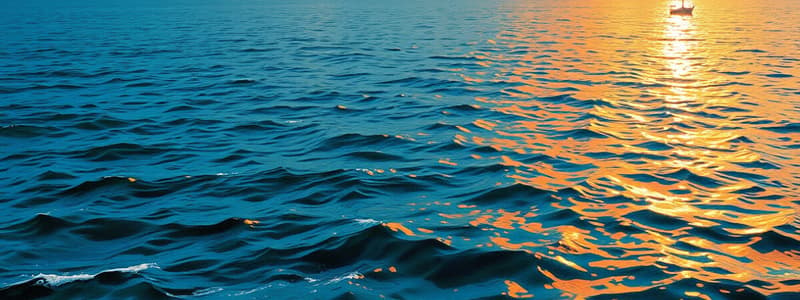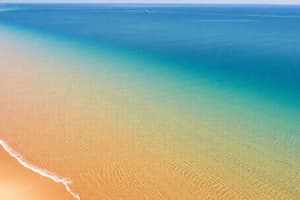Podcast
Questions and Answers
What is the largest ocean on Earth?
What is the largest ocean on Earth?
- Arctic Ocean
- Atlantic Ocean
- Indian Ocean
- Pacific Ocean (correct)
Which ocean is located to the south of Asia?
Which ocean is located to the south of Asia?
- Indian Ocean (correct)
- Pacific Ocean
- Arctic Ocean
- Atlantic Ocean
What ocean is known for its cold temperatures and icebergs?
What ocean is known for its cold temperatures and icebergs?
- Mediterranean Sea
- Indian Ocean
- Atlantic Ocean
- Arctic Ocean (correct)
Which sea separates the United Kingdom from mainland Europe?
Which sea separates the United Kingdom from mainland Europe?
Which of the following is a major river in North America?
Which of the following is a major river in North America?
The Ganges River is primarily located in which country?
The Ganges River is primarily located in which country?
What is the longest river in the world?
What is the longest river in the world?
What sea is located between Europe and Asia?
What sea is located between Europe and Asia?
What is the second largest ocean on Earth?
What is the second largest ocean on Earth?
What type of body of water is the Persian Gulf?
What type of body of water is the Persian Gulf?
What is the capital of Egypt located near?
What is the capital of Egypt located near?
Flashcards are hidden until you start studying
Study Notes
Oceans
- Atlantic Ocean: Second largest ocean, crucial for global trade and climate regulation.
- Pacific Ocean: Largest and deepest ocean, home to the Mariana Trench.
- Indian Ocean: Third largest ocean, known for its significant shipping lanes.
- Arctic Ocean: Smallest and shallowest ocean, mostly covered in ice.
Seas
- North Sea: Located between Great Britain and mainland Europe, rich in oil and natural gas.
- Baltic Sea: Enclosed by northern Europe, known for low salinity and significant biodiversity.
- English Channel: Connects the North Sea to the Atlantic Ocean; separates UK from continental Europe.
- Norwegian Sea: Part of the North Atlantic, located northwest of Norway.
- Mediterranean Sea: Famous for its historical significance, surrounded by Europe, Asia, and Africa.
- Adriatic Sea: Situated between Italy and the Balkan Peninsula, known for its diverse marine life.
- Aegean Sea: Located between Greece and Turkey, dotted with numerous islands.
- Black Sea: Surrounded by Eastern Europe and western Asia; unique for its anoxic waters.
- Caspian Sea: Largest enclosed inland body of water, bordered by five countries.
- Great Lakes: Group of five freshwater lakes in North America; largest by surface area.
- Red Sea: Narrow sea between Africa and Asia, known for its coral reefs and unique marine species.
- Persian Gulf: Key body of water for oil transportation, bordered by Iran and the Arabian Peninsula.
- Arabian Sea: Part of the Indian Ocean, important for trade routes.
- Bay of Bengal: Largest bay, significant for its biodiversity and cyclonic activity.
- South China Sea: Highly disputed region, known for shipping lanes and rich resources.
- East China Sea: Located beside China and Taiwan, important fishery region.
- Yellow Sea: Between China and Korea, known for its yellow silt from the Yellow River.
- Sea of Japan: Lies between Japan and the Korean Peninsula, rich in marine resources.
- Caribbean Sea: Notable for tourism, biodiversity, and historic shipping routes.
- Hudson Bay: Large inland sea in Canada, significant for its ecological diversity.
Capes
- Cape of Good Hope: Marks the southern tip of Africa, historically important for navigation.
- Cape Horn: Southernmost point of South America, known for challenging sailing conditions.
Gulfs
- Gulf of Guinea: Located off the west coast of Africa, rich in oil deposits.
- Gulf of Mexico: Surrounded by the United States, Mexico, and Cuba; major area for oil drilling.
Straits
- Bosporus Strait: Connects the Black Sea to the Sea of Marmara; critical for shipping.
- Strait of Magellan: Navigable sea route between South America and Tierra del Fuego.
- Strait of Gibraltar: Connects the Atlantic Ocean to the Mediterranean Sea; vital for maritime passage.
- Strait of Malacca: Important shipping route in Southeast Asia, between Peninsular Malaysia and Sumatra.
- Dardanelles Strait: Connects the Aegean Sea to the Sea of Marmara; historically significant.
Rivers
- Nile River: Longest river in the world, essential for agriculture in Egypt.
- Amazon River: Largest river by volume, home to diverse wildlife in the Amazon rainforest.
- Mississippi River: Major river system in the U.S. for commerce and ecology.
- Rio Grande River: Natural border between the U.S. and Mexico, significant for water resources.
- Indus River: Crucial for agriculture in Pakistan; historical cradle of the Indus Valley Civilization.
- Ganges River: Sacred to Hindus, significant for its cultural and religious importance in India.
- Danube River: Europe's second longest river, flows through multiple countries.
- Yangtze River: Longest river in Asia, vital for trade and agriculture in China.
- Huang He (Yellow) River: Known as the "cradle of Chinese civilization," important agricultural resource.
- Tigris River: Flows through Iraq, historically significant for ancient civilizations.
- Euphrates River: One of the most important rivers in the Middle East; forms part of the historical Fertile Crescent.
- Irrawaddy River: Main river in Myanmar, vital for transport and agriculture.
- Mekong River: Flows through Southeast Asia, supports diverse ecosystems and communities.
- Congo River: Second longest river in Africa, known for its rainforest and biodiversity.
- Rhine River: Important transport route in Europe, known for its picturesque landscapes.
- Niger River: Major river in West Africa, crucial for agriculture and fishing.
Studying That Suits You
Use AI to generate personalized quizzes and flashcards to suit your learning preferences.




